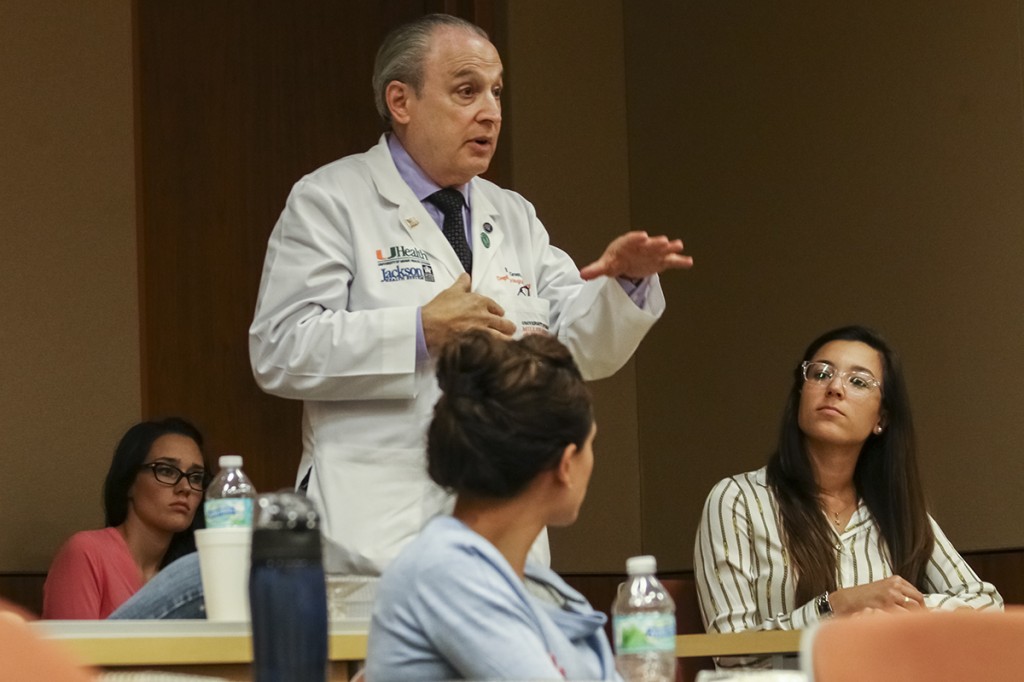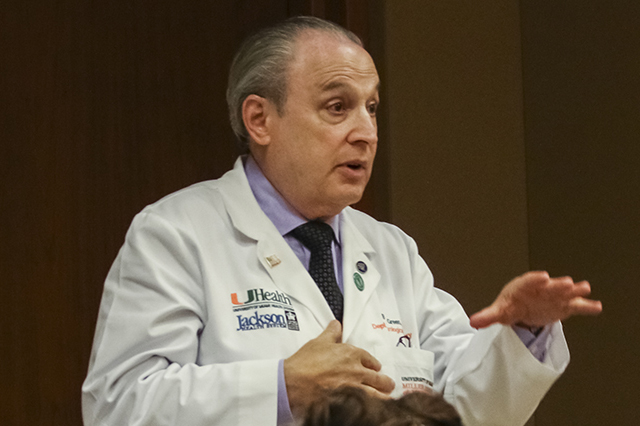
As hospitals and communities around the world take action against the possibility of Ebola, the University of Miami is also taking preventative measures.
The Miller School of Medicine issued an Ebola preparedness manual and organized an information session Friday at the Gordon Center for Research in Medical Education.
Dr. Barth Green, chairman of the department of neurological surgery at the Miller School and a speaker at Friday’s session, said the issue needs coordinated action.
“Everyone says it’s a state problem or it’s a county problem or it’s a hospital problem,” he said. “But the truth is this is a federal issue, it’s a national issue and it has to be dealt with rapidly, with coordinated effort that’s very feasible and practical.”
Green also added that UM-affiliated hospitals Jackson Memorial Hospital, University of Miami Hospital, the Sylvester Center and the Veterans Affairs Medical Center are all undergoing educational training, equipping and supplying. The medical complexes have also designated reception areas for screening and testing agents that could be at high risk.
According to the Centers for Disease Control and Prevention, this year’s Ebola epidemic is the largest in history. The disease began in West Africa, mainly affecting Liberia, Guinea and Sierra Leone. So far, according to the World Health Organization, there have been 10,141 cases in the world, 4,922 of which resulted in death.
While the event was mainly geared toward public health students and faculty, Julie Kornfeld, assistant dean for public health at Miller, hopes to organize more information sessions for the rest of the Miller school and other UM campuses.
“We wanted to make sure that we brought together people who are experts on infectious diseases and Ebola in one room so that our students and our department can be very well informed,” she said.
Sam-Mosley Ayuk, a second year public health graduate student who attended Friday’s session, expressed the importance of community awareness and education to lessen the fear of Ebola.
“The community has to put a lot of effort in letting people know about Ebola to make them lose that hysteria,” he said. “There’s a lot of fear and stigmatization, so people have to be really enlightened about what’s going on, both here and in the source in West Africa.”
In addition to discussing the transmissibility of the virus and the measures being taken both locally and globally, speakers discussed the negative magnification of U.S. Ebola cases in the media.
“The media has caused fear to spread due to a pinpoint number of cases in one hospital in Texas,” said James Schultz, director of Miller’s Center for Disaster and Extreme Event Preparedness, during the session. “The psychological footprint is much bigger than the medical footprint.”
Nevertheless, UM health officials recommend that people remain aware of the situation’s developments.
“We all need to be informed because an educated community is one that can preserve health,” Kornfeld said. “So if everybody knows about it and people are connected to the right information, then we can all understand what role we can play.”






